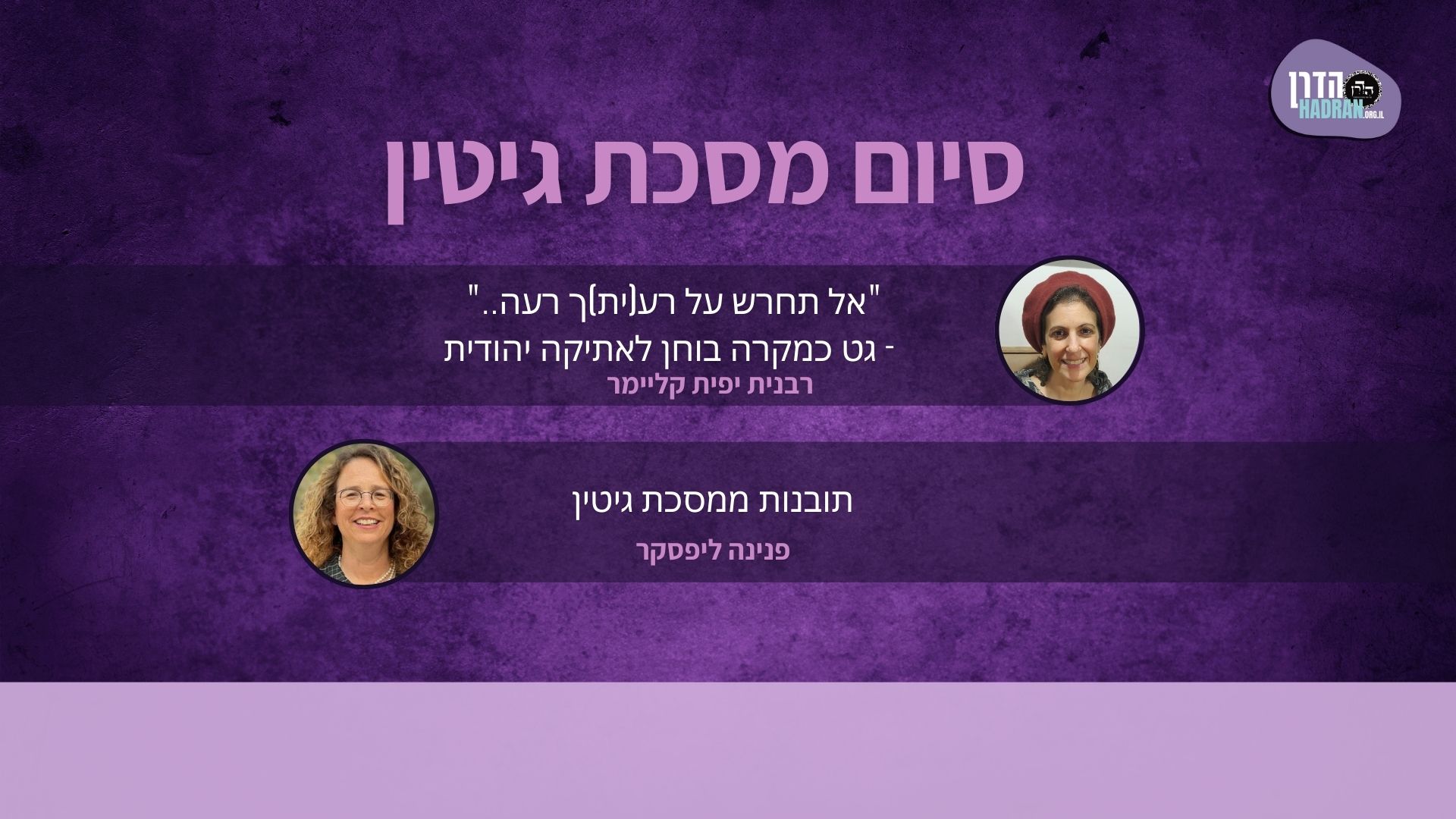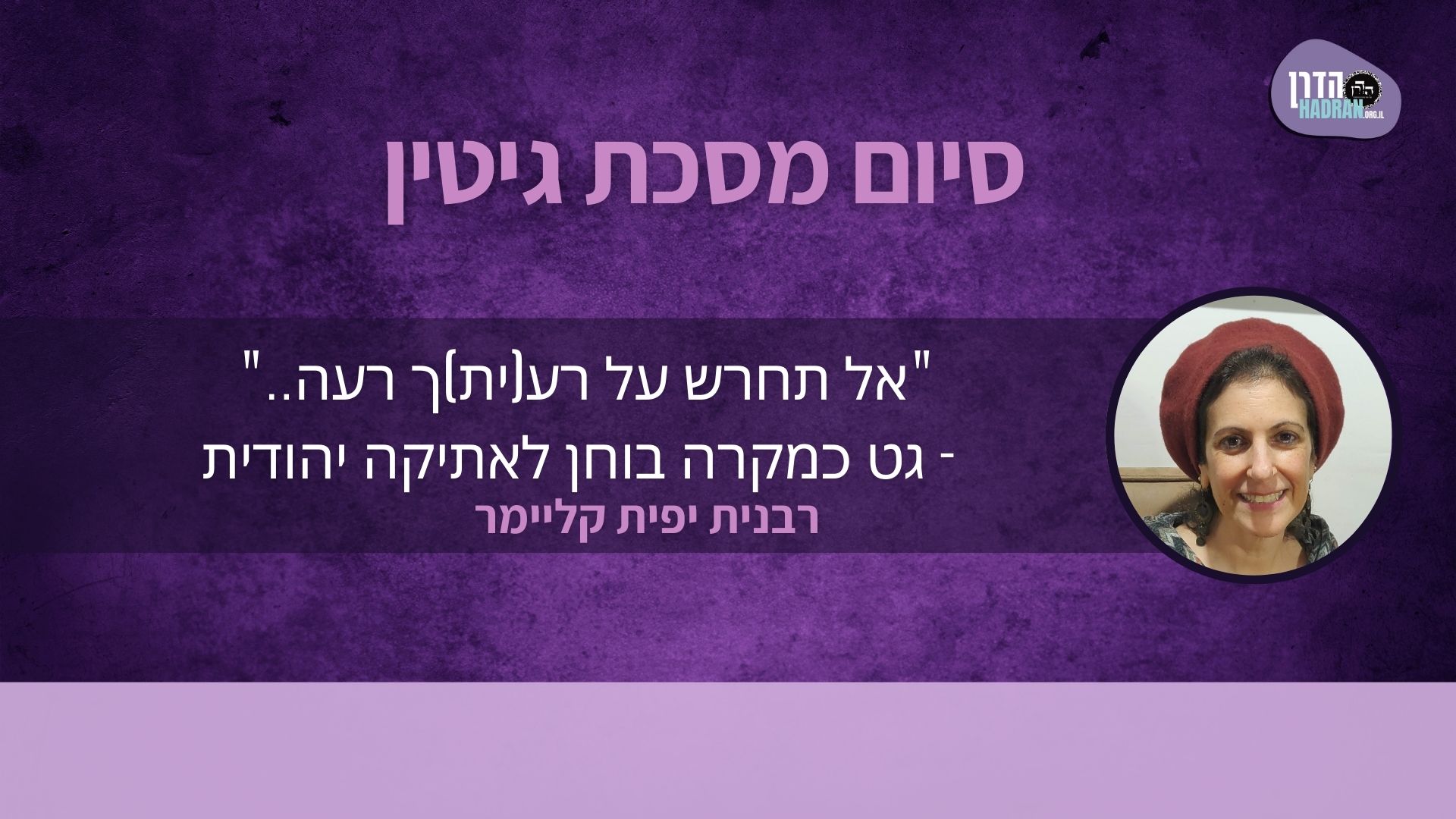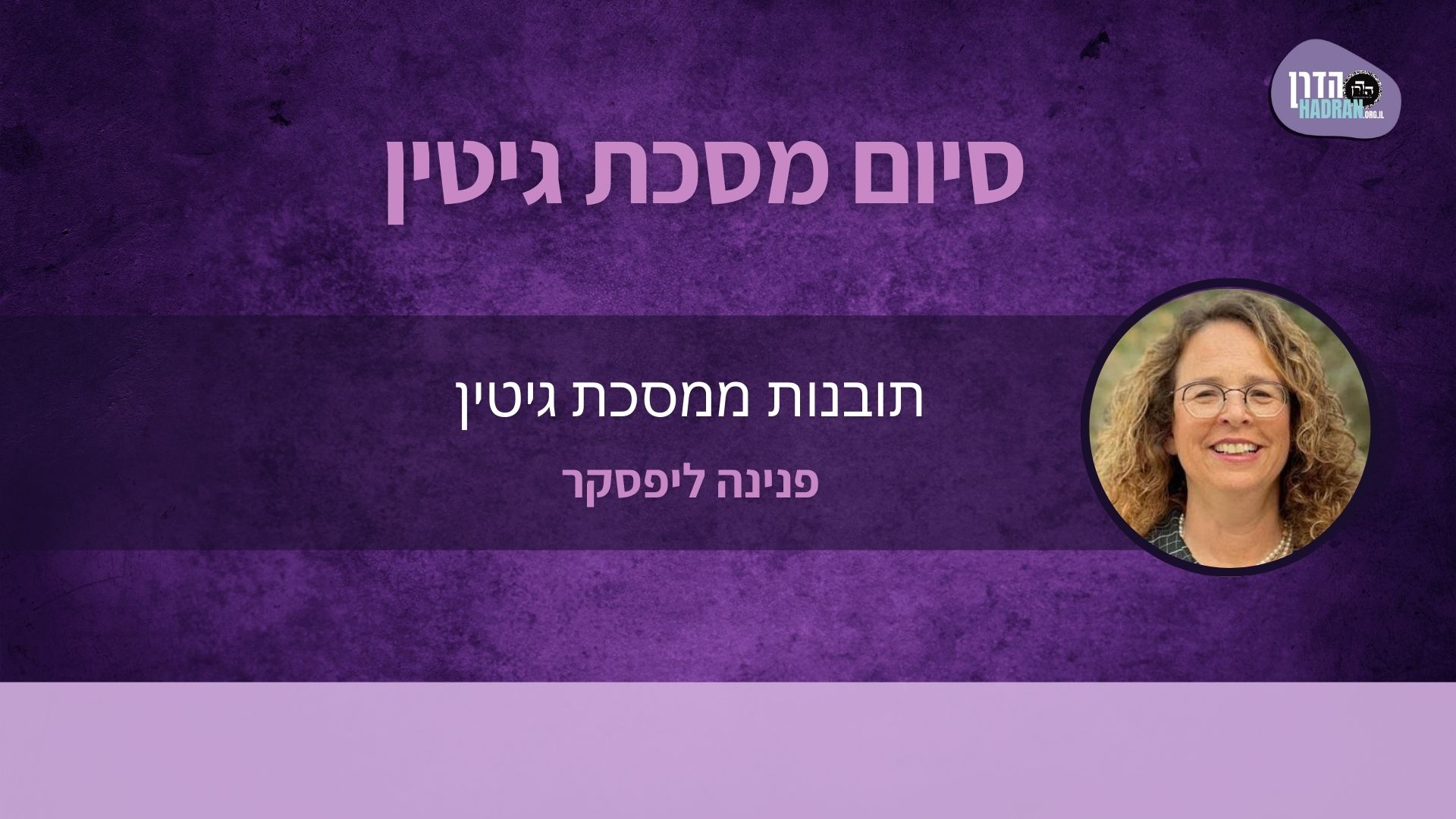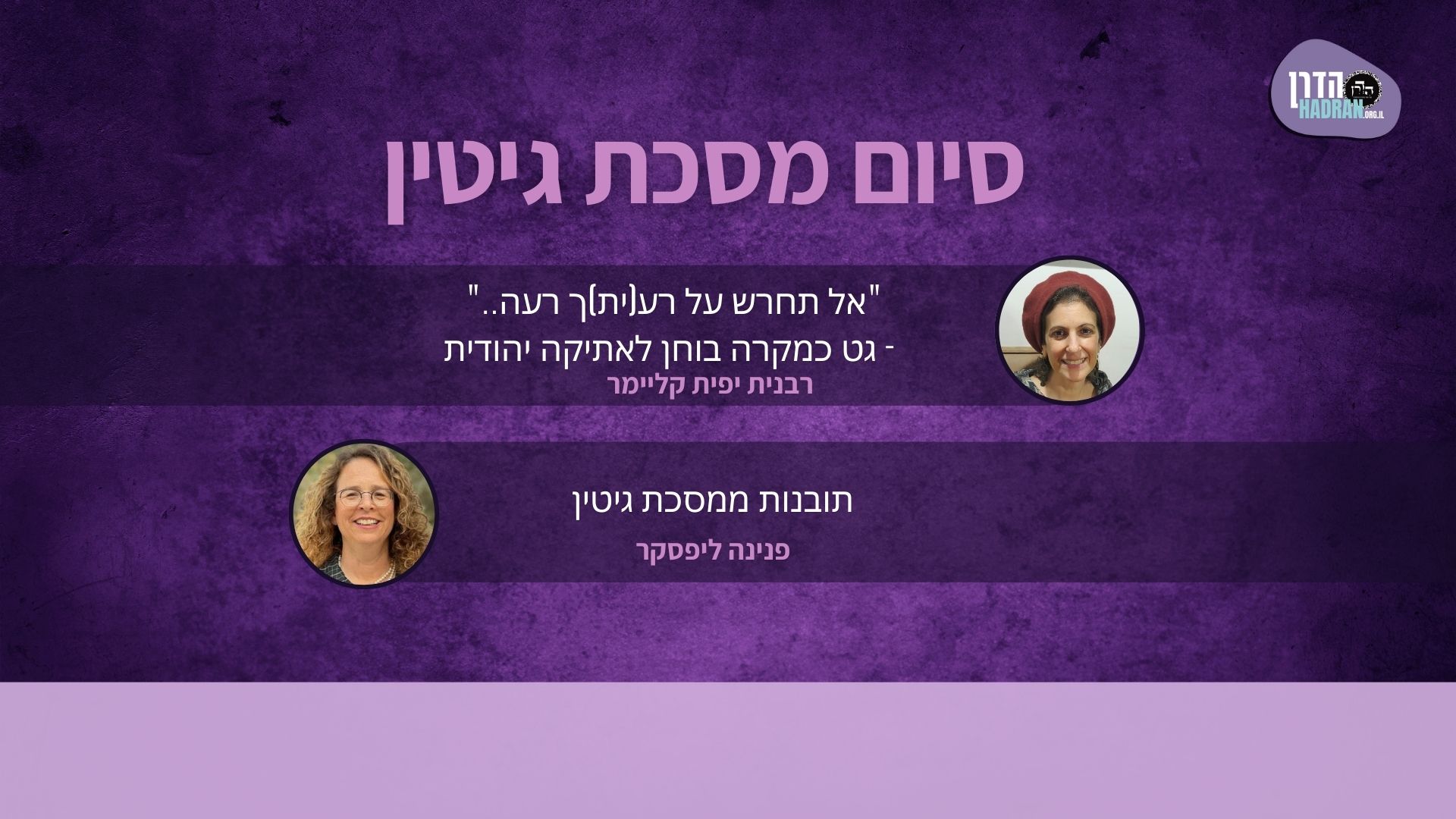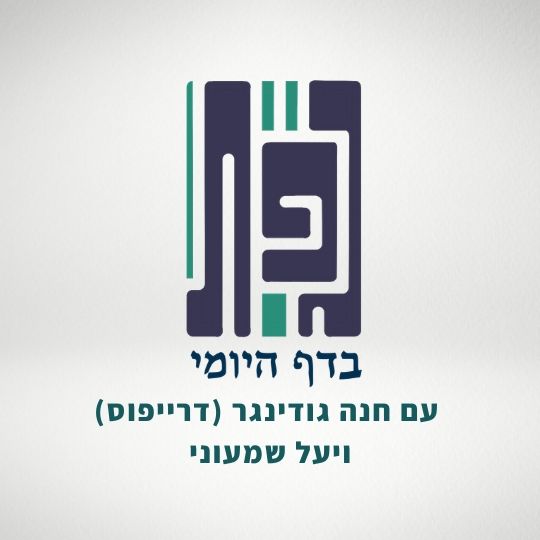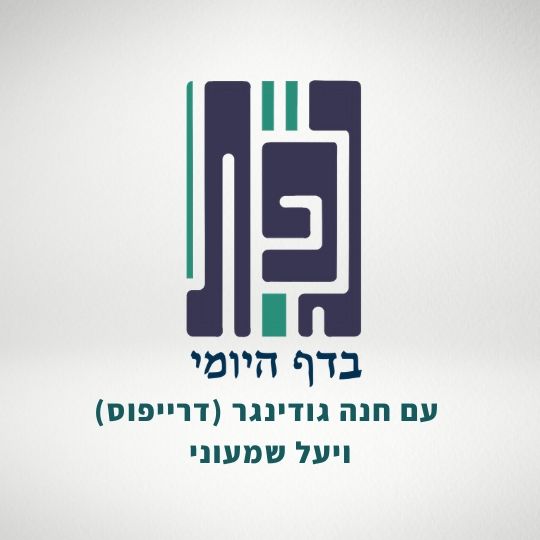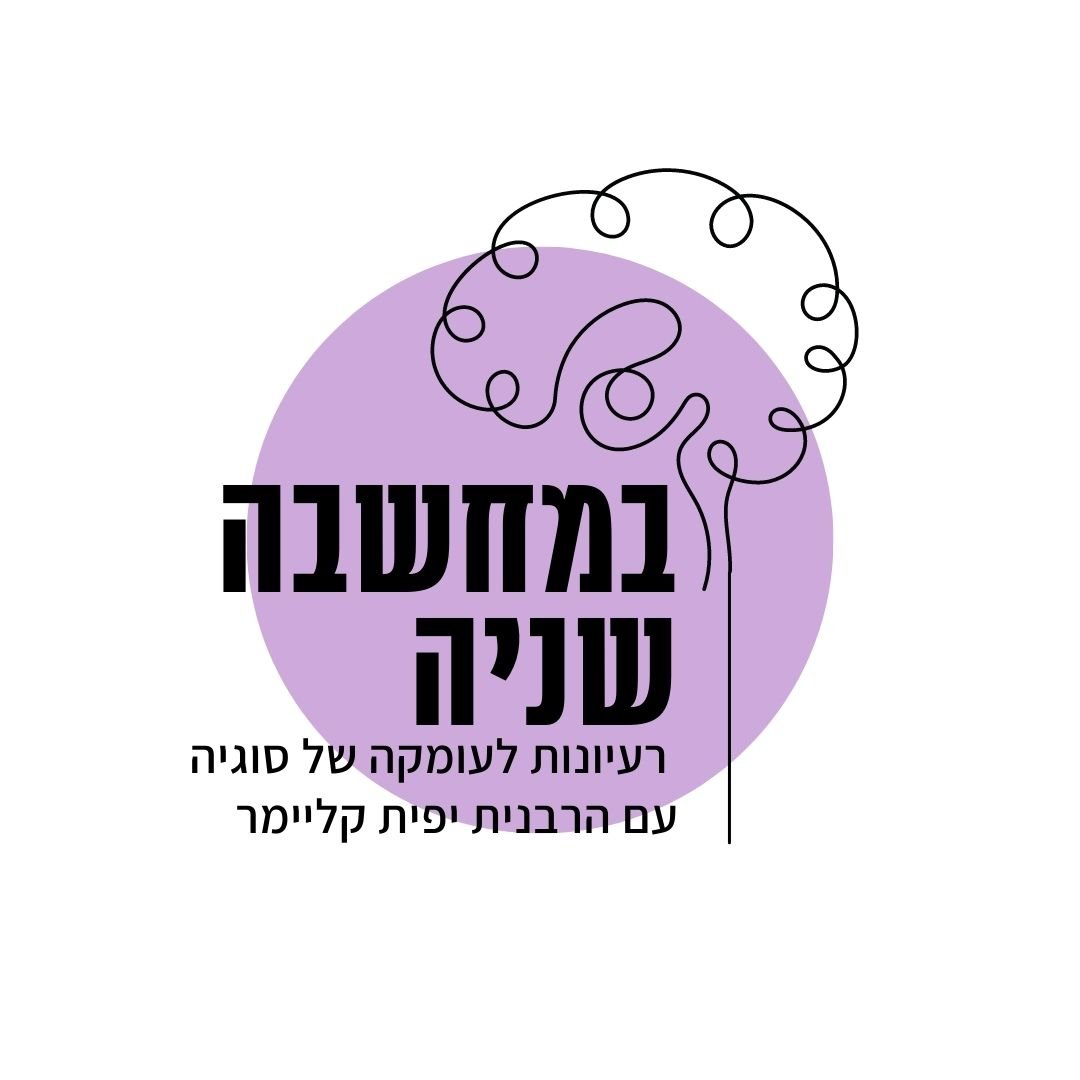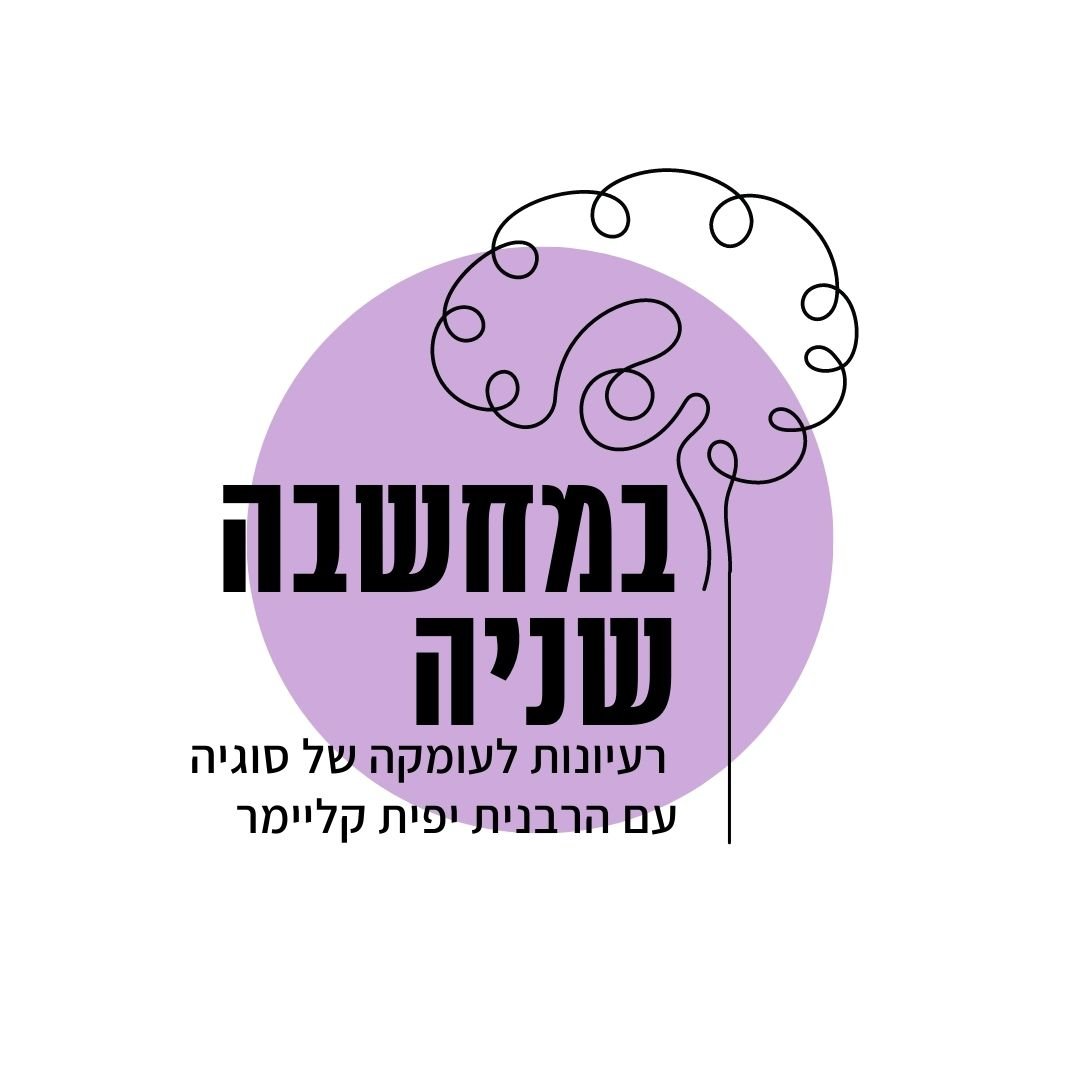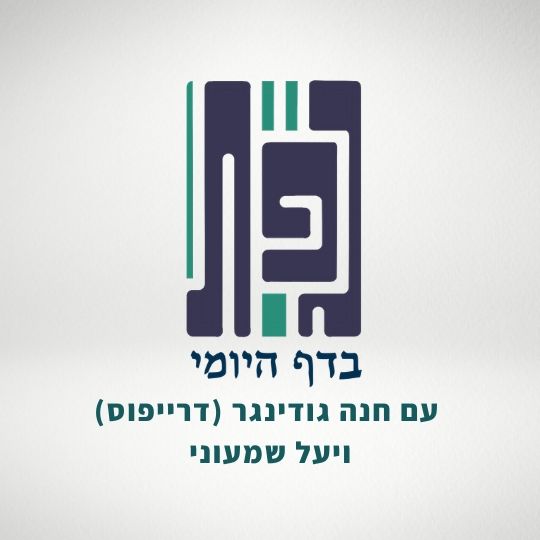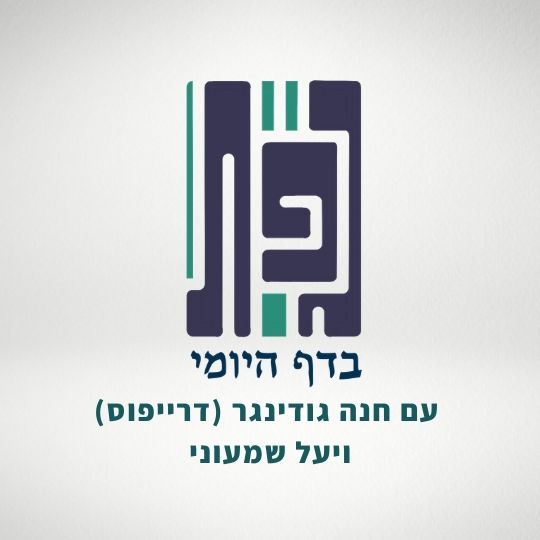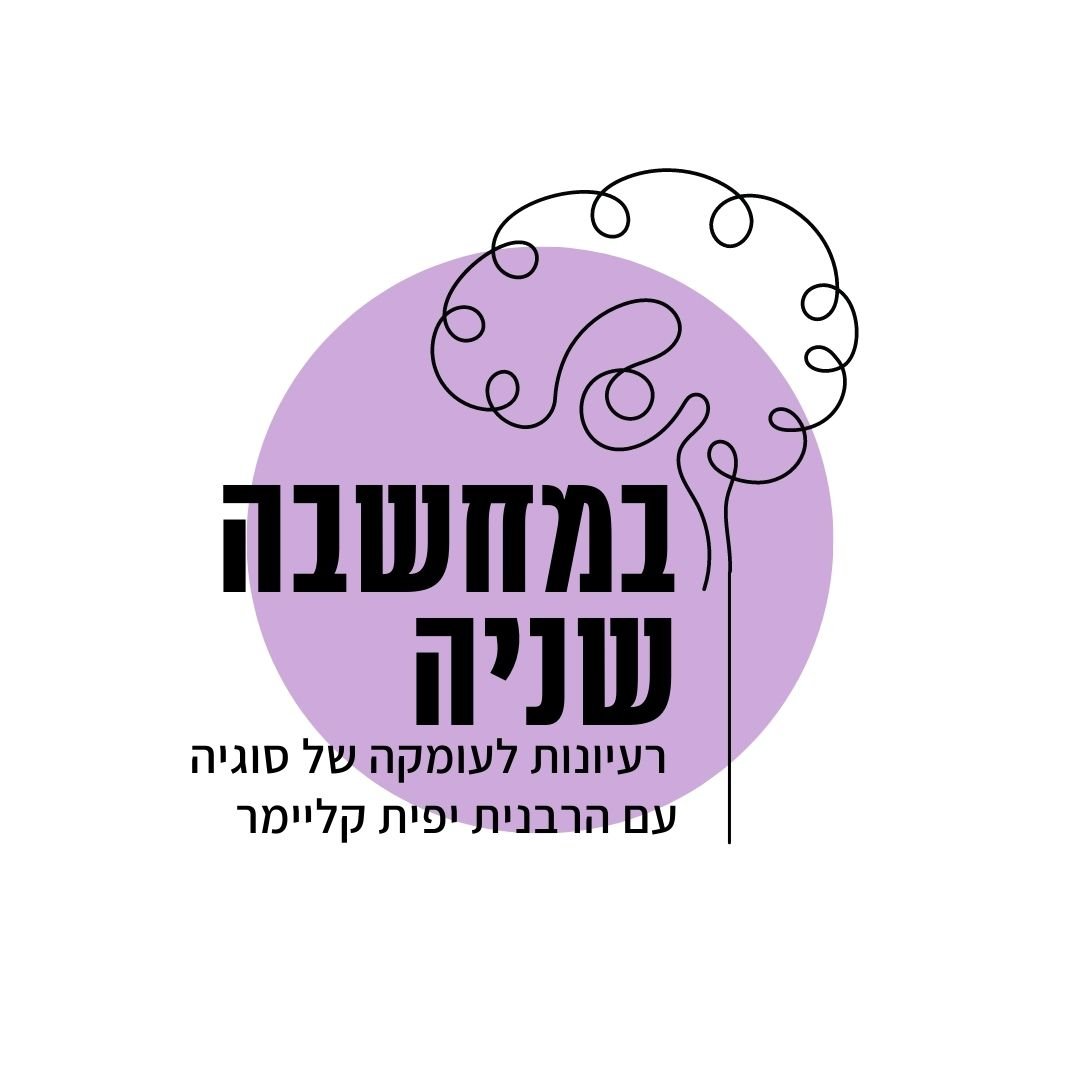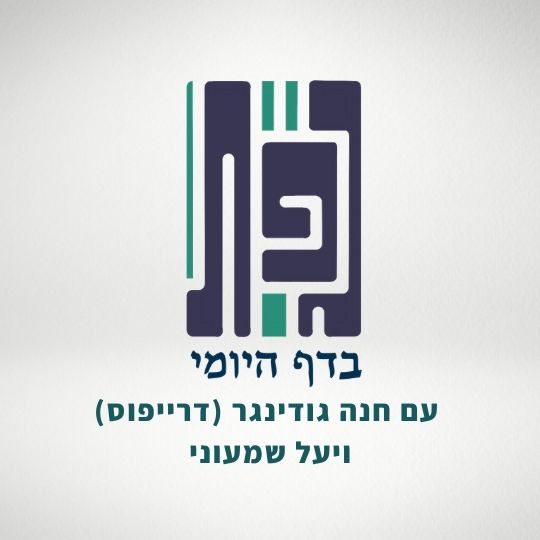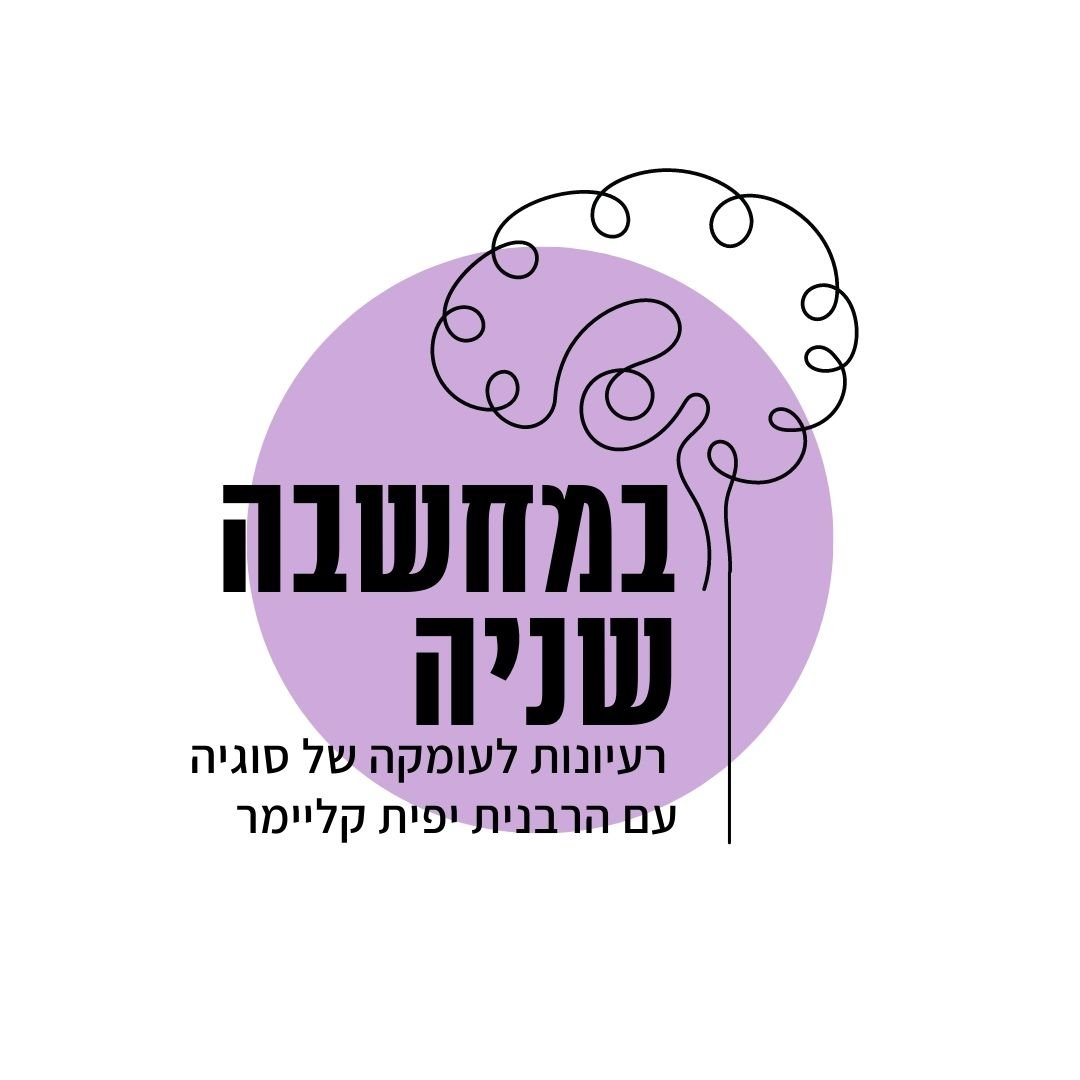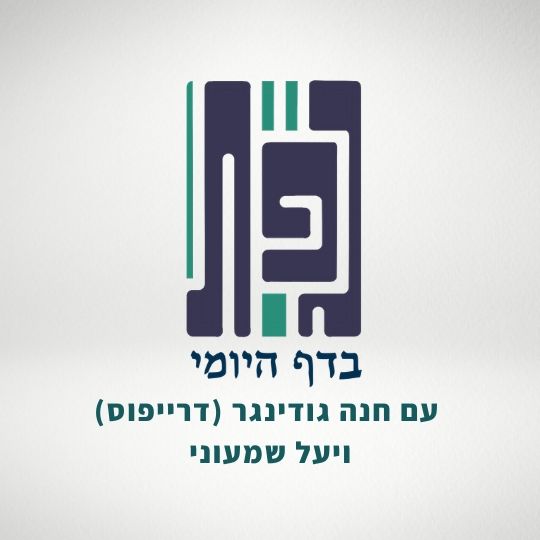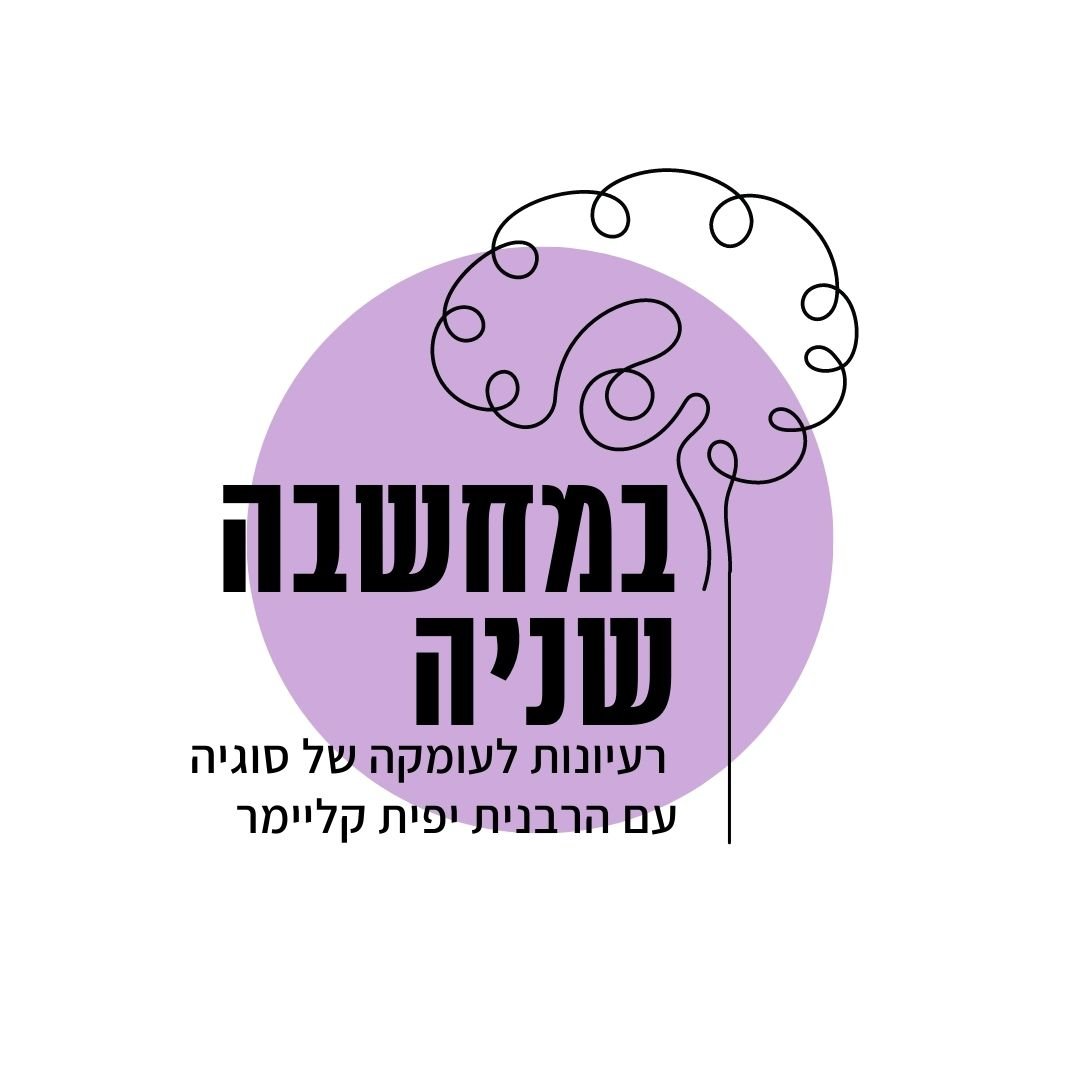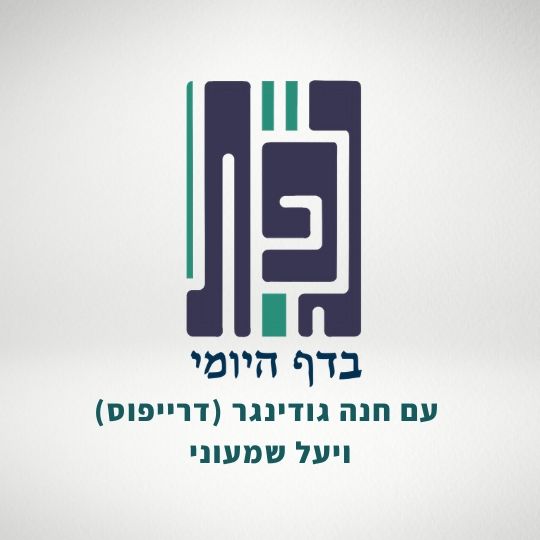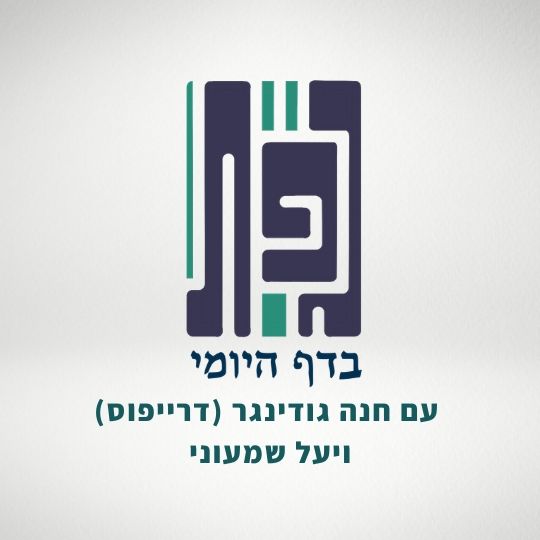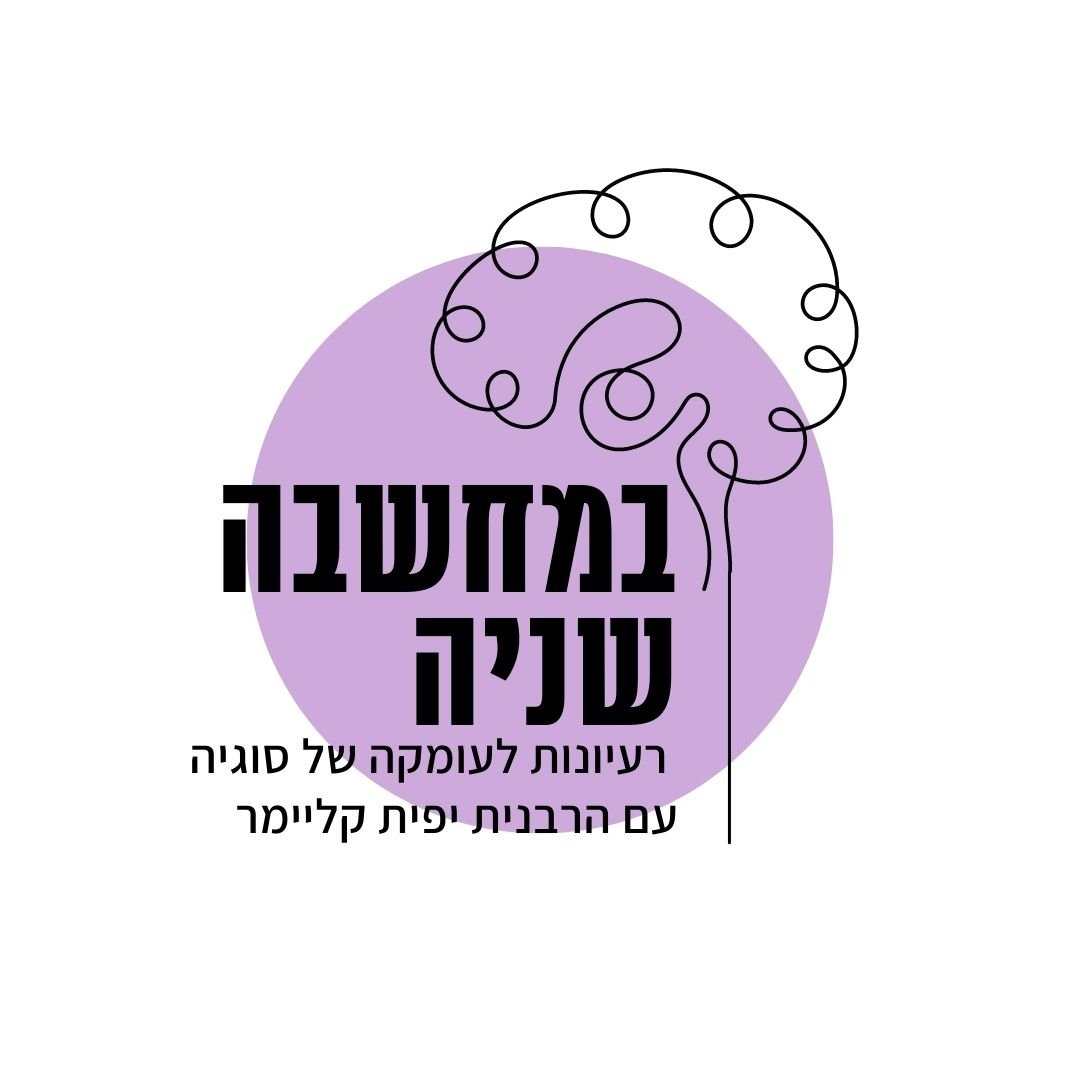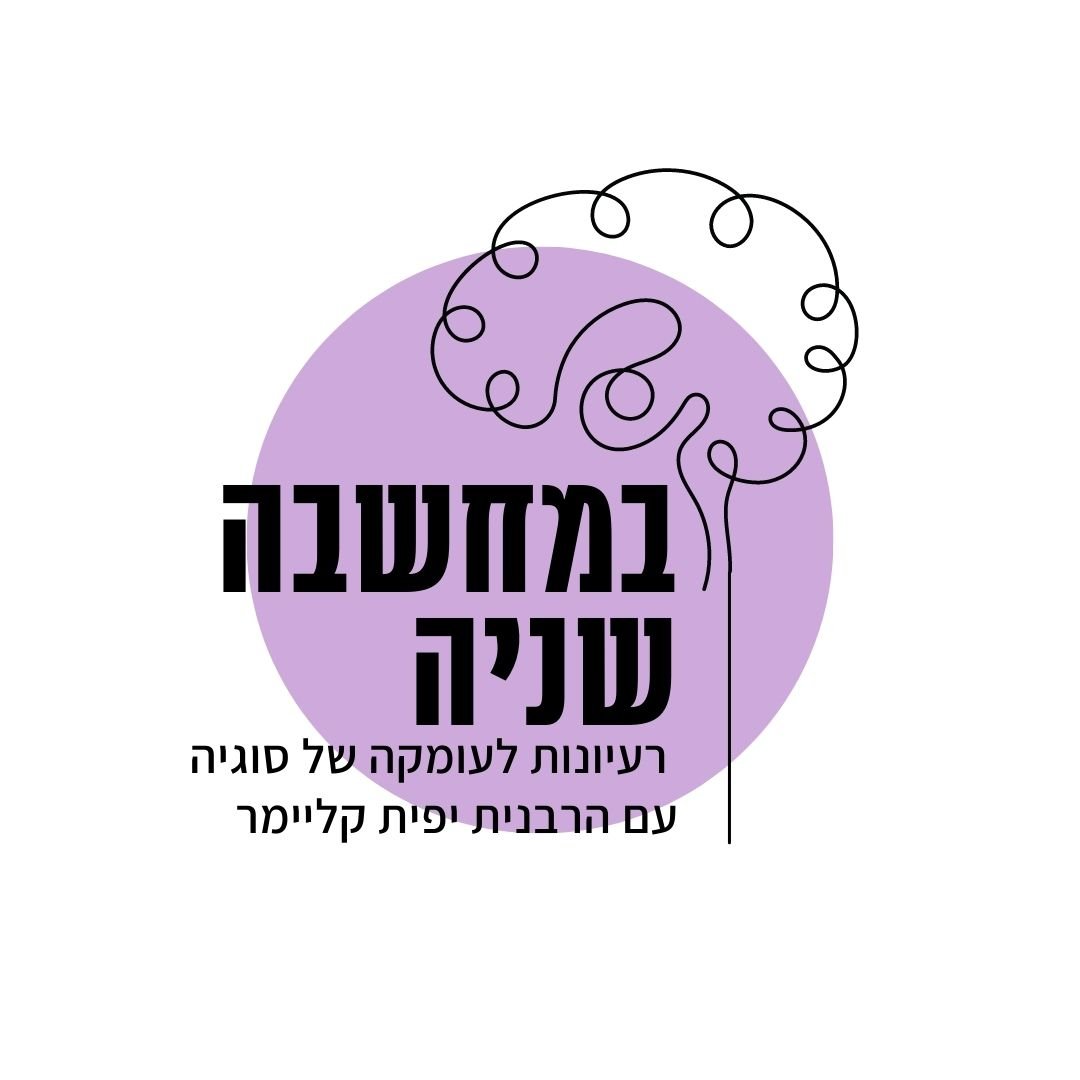הלימוד השבוע מוקדש לזכות ולשלום הַיְימׇנוֹט אֱמוּנָה בַּת באנצ’י (קָסָאוּ) בת 11 שנעלמה במקום מגוריה בצפת, לפני שנתיים, ביום ט”ז אדר תשפ”ד (25.2.24), ולא נודעו עקבותיה.
הלימוד השבוע מוקדש למען ביטחון המדינה, החיילים והאזרחים, ולמען חירותו של העם האיראני. שנזכה בקרוב שיתקיים בנו הפסוק: "לַיְּהוּדִים הָיְתָה אוֹרָה וְשִׂמְחָה וְשָׂשֹׂן וִיקָר”.
רוצה להקדיש שיעור?

כלים
הלימוד השבוע מוקדש לזכות ולשלום הַיְימׇנוֹט אֱמוּנָה בַּת באנצ’י (קָסָאוּ) בת 11 שנעלמה במקום מגוריה בצפת, לפני שנתיים, ביום ט”ז אדר תשפ”ד (25.2.24), ולא נודעו עקבותיה.
הלימוד השבוע מוקדש למען ביטחון המדינה, החיילים והאזרחים, ולמען חירותו של העם האיראני. שנזכה בקרוב שיתקיים בנו הפסוק: "לַיְּהוּדִים הָיְתָה אוֹרָה וְשִׂמְחָה וְשָׂשֹׂן וִיקָר”.
כלים
העמקה
רוצה להבין מה באמת קורה מתחת לפני השטח של הסוגיה?
שיעורים, פודקאסטים והרחבות של מיטב המורות שלנו יפתחו לך עוד זוויות וכיווני חשיבה.
חדשה בלימוד הגמרא?
זה הדף הראשון שלך? איזו התרגשות עצומה! יש לנו בדיוק את התכנים והכלים שיעזרו לך לעשות את הצעדים הראשונים ללמידה בקצב וברמה שלך, כך תוכלי להרגיש בנוח גם בתוך הסוגיות המורכבות ומאתגרות.
פסיפס הלומדות שלנו
גלי את קהילת הלומדות שלנו, מגוון נשים, רקעים וסיפורים. כולן חלק מתנועה ומסע מרגש ועוצמתי.
גיטין פב
דְּקָא מְדַלֵּג וְתָנֵי חַד חַד; שְׁמַע מִינַּהּ.
as it teaches by skipping one by one. The examples given relate to one witness missing, e.g., seven ties and six witnesses, and so on. They do not include a case in which two witnesses are missing, e.g., seven ties and five witnesses. This indicates that the dispute between Rabbi Akiva and Ben Azzai is only with regard to the signature of one witness. The Gemara affirms: Conclude from it that this is so.
אָמַר אַבָּיֵי: שְׁמַע מִינַּהּ, הַאי קָרוֹב חָתֵים אִי בָּעֵי – בֵּין בַּתְּחִילָּה, בֵּין בָּאֶמְצַע, בֵּין בַּסּוֹף.
Abaye said: Learn from it that this relative, who is allowed to sign a folded and tied bill of divorce, can sign if he wants to sign, either at the beginning, as the first signature, in the middle, or at the end.
מִמַּאי – מִדְּלָא קְבַע לֵיהּ מָקוֹם. וּשְׁמַע מִינַּהּ: מִכֹּל תְּלָתָא מְקַיְּימִינַן, וְלָא בָּעֵינַן רְצוּפִין.
From where does Abaye infer this? From the fact that it did not designate a place for him to sign. And learn from it, as well, that from any three of the witnesses who signed on a folded and tied bill of divorce, we can ratify the bill of divorce, i.e., it can be ratified based on their signatures. And we do not need to confirm the signatures specifically of three consecutive witnesses.
דְּאִי סָלְקָא דַעְתָּךְ בָּעֵינַן רְצוּפִין, לִקְבַּע לֵיהּ מָקוֹם לְהַאי קָרוֹב – בַּתְּחִילָּה אוֹ בָּאֶמְצַע אוֹ בַּסּוֹף; וְלַכְשַׁר בֵּיהּ טוּבָא.
As if it enters your mind that we need consecutive witnesses, then they should designate a place for this relative to sign, in the beginning, or in the middle, or at the end, and they should then validate the use of many disqualified witnesses. It could have been instituted that every third witness may be disqualified. Since in any group of three witnesses, two of them would be valid, more than one disqualified witness could be allowed. Since it is possible to ratify a bill of divorce by confirming signatures that are not consecutive, and therefore there is concern that the court will rely on two disqualified witnesses, the Sages consequently allowed the use of only one disqualified witness.
כִּי אָתוּ לְקַמֵּיהּ דְּרַבִּי אַמֵּי, אֲמַר לֵיהּ: צֵא וְהַשְׁלֵים עָלָיו עֶבֶד מִן הַשּׁוּק.
With regard to the halakha concerning the dispute in the mishna, it is related that when they came before Rabbi Ami with a question pertaining to a bare bill of divorce that needed more witnesses, he said to the person overseeing: Go out and complete it even with a slave from the general public, in accordance with the opinion of ben Nannas.
הֲדַרַן עֲלָךְ הַזּוֹרֵק
הַמְגָרֵשׁ אֶת אִשְׁתּוֹ, וְאָמַר לָהּ: ״הֲרֵי אַתְּ מוּתֶּרֶת לְכׇל אָדָם, אֶלָּא לִפְלוֹנִי״. רַבִּי אֱלִיעֶזֶר מַתִּיר, וַחֲכָמִים אוֹסְרִים. כֵּיצַד יַעֲשֶׂה? יִטְּלֶנּוּ הֵימֶנָּה וְיַחֲזוֹר וְיִתְּנֶנּוּ לָהּ, וְיֹאמַר לָהּ: ״הֲרֵי אַתְּ מוּתֶּרֶת לְכׇל אָדָם״. כְּתָבוֹ בְּתוֹכוֹ, אַף עַל פִּי שֶׁחָזַר וּמְחָקוֹ – פָּסוּל.
MISHNA: With regard to one who divorces his wife and said to her while handing her the bill of divorce: You are hereby permitted to marry any man except [ella] for so-and-so, Rabbi Eliezer permits her to remarry based on this divorce. And the Rabbis prohibit her from remarrying, as their bond is not entirely severed by this divorce, and she is therefore still considered his wife. What should he do so the divorce may take effect? He should take it from her and hand it to her again, and he should say to her: You are hereby permitted to marry any man. If he wrote his qualification inside the bill of divorce, even if he then erased it, the bill is invalid since it was not written in a valid manner.
גְּמָ׳ אִיבַּעְיָא לְהוּ: הַאי ״אֶלָּא״ – ״חוּץ״ הוּא, אוֹ ״עַל מְנָת״ הוּא?
GEMARA: A dilemma was raised before the Sages: What is the meaning of this word ella in the husband’s statement? Does it mean except, i.e., the husband intended to divorce his wife in a manner that would render her permitted to marry only a limited group of men? Or does it mean: On the condition, i.e., the husband intended to grant her full divorce on the condition that she would not marry so-and-so?
״חוּץ״ הוּא – וּבְ״חוּץ״ הוּא דִּפְלִיגִי רַבָּנַן עֲלֵיהּ דְּרַבִּי אֱלִיעֶזֶר, דְּהָא שַׁיַּיר לַהּ בְּגֵט; אֲבָל בְּ״עַל מְנָת״ – מוֹדוּ לֵיהּ, מִידֵּי דְּהָוֵה אַכֹּל תְּנָאֵי דְּעָלְמָא;
The Gemara elaborates on how this dilemma affects the understanding of the dispute between Rabbi Eliezer and the Rabbis: Does ella mean except, and therefore it is specifically with regard to the exception of a certain man from the intended divorce that the Rabbis disagree with Rabbi Eliezer and hold that the divorce is invalid? This would be because in a case where the husband noted an exception, it is as if he left out part of her bill of divorce; since she is not permitted to remarry anyone she wishes it does not entirely sever the bond between them. But with regard to divorce on the condition that she will not marry a certain man the Rabbis agree with Rabbi Eliezer that it is valid, just as is the case with regard to any typical condition which the husband attaches to the divorce of his wife.
אוֹ דִלְמָא ״עַל מְנָת״ הוּא – וּבְ״עַל מְנָת״ הוּא דִּפְלִיג רַבִּי אֱלִיעֶזֶר אַדְּרַבָּנַן; אֲבָל בְּ״חוּץ״ מוֹדֶה – דְּהָא שַׁיַּיר לַהּ בְּגֵט.
Or perhaps this is the meaning of ella: On the condition? Accordingly, it is specifically with regard to divorce on the condition that the wife will not marry a certain man that Rabbi Eliezer disagrees with the Rabbis and allows her to remarry based on this divorce; but with regard to the exception of a certain man from the woman’s right to remarry he concedes that the divorce is invalid as the husband left out part of her bill of divorce.
אָמַר רָבִינָא, תָּא שְׁמַע: כׇּל הַבָּתִּים מִטַּמְּאִין בִּנְגָעִים, אֶלָּא שֶׁל גּוֹיִם. אִי אָמְרַתְּ בִּשְׁלָמָא ״חוּץ״ הוּא – שַׁפִּיר; אֶלָּא אִי אָמְרַתְּ ״עַל מְנָת״ הוּא – עַל מְנָת דְּלָא מִיטַּמּוּ בָּתֵּי גוֹיִם הוּא דְּמִיטַּמּוּ בָּתֵּי יִשְׂרָאֵל, הָא מִיטַּמּוּ בָּתֵּי גוֹיִם – לָא מִטַּמְּאִי בָּתֵּי יִשְׂרָאֵל?!
Ravina said: Come and hear a solution to this dilemma from the following mishna (Nega’im 12:1): All houses become ritually impure through leprous sores of the house except [ella] for those belonging to gentiles. Granted, if you say that the meaning of the word ella is except, this mishna is well understood. But if you say that its meaning is on the condition, the resulting interpretation of this mishna is that the houses of Jews become impure only on the condition that the houses of gentiles do not become impure; consequently, if the houses of gentiles become impure, the houses of Jews do not become impure. Does this interpretation make any sense?
וְעוֹד, בָּתֵּי גוֹיִם מִי מִטַּמְּאִי?! וְהָתַנְיָא: ״וְנָתַתִּי נֶגַע צָרַעַת בְּבֵית אֶרֶץ אֲחוּזַּתְכֶם״ – אֶרֶץ אֲחוּזַּתְכֶם מִטַּמְּאָה בִּנְגָעִים, וְאֵין בָּתֵּי גוֹיִם מִטַּמְּאִין בִּנְגָעִים! אֶלָּא שְׁמַע מִינַּהּ ״חוּץ״ הוּא; שְׁמַע מִינַּהּ.
Moreover, an objection against this interpretation may be raised as follows: Do the houses of gentiles become ritually impure at all? But isn’t it taught in a baraita that from the verse: “And I put the plague of leprosy in a house of the land of your possession” (Leviticus 14:34), it is derived that only the land of your possession, i.e., the houses of Jews, becomes impure through leprous sores of the house, but the houses of gentiles do not become impure through leprosy? Rather, conclude from the mishna that the meaning of ella is except. The Gemara concludes: Conclude from it that ella means except.
מַתְנִיתִין דְּלָא כִּי הַאי תַּנָּא – דְּתַנְיָא, אָמַר רַבִּי יוֹסֵי בְּרַבִּי יְהוּדָה: לֹא נֶחְלְקוּ רַבִּי אֱלִיעֶזֶר וַחֲכָמִים עַל הַמְגָרֵשׁ אֶת אִשְׁתּוֹ, וְאָמַר לָהּ: ״הֲרֵי אַתְּ מוּתֶּרֶת לְכׇל אָדָם, חוּץ מִפְּלוֹנִי״ – שֶׁאֵינָהּ מְגוֹרֶשֶׁת. עַל מָה נֶחְלְקוּ? עַל הַמְגָרֵשׁ אִשְׁתּוֹ, וְאָמַר לָהּ: ״הֲרֵי אַתְּ מוּתֶּרֶת לְכׇל אָדָם, עַל מְנָת שֶׁלֹּא תִּנָּשְׂאִי לִפְלוֹנִי״ –
According to this conclusion, our mishna is not in accordance with the opinion of this tanna, as it is taught in a baraita that Rabbi Yosei, son of Rabbi Yehuda, said: Rabbi Eliezer and the Rabbis did not disagree with regard to one who divorces his wife and said to her while handing her the bill of divorce: You are hereby permitted to marry any man except for so-and-so; rather, they were in agreement that in that case she is not divorced. With regard to what case did they disagree? It was with regard to one who divorces his wife and said to her: You are hereby permitted to marry any man on the condition that you will not marry so-and-so,
שֶׁרַבִּי אֱלִיעֶזֶר מַתִּיר לְכׇל אָדָם חוּץ מֵאוֹתוֹ הָאִישׁ, וַחֲכָמִים אוֹסְרִים.
as in this case Rabbi Eliezer permits her to marry any man except for that man about whom the condition was made, and the Rabbis prohibit her from remarrying, as in their opinion this divorce is not valid.
מַאי טַעְמָא דְּרַבִּי אֱלִיעֶזֶר? מִידֵּי דְּהָוֵה אַכֹּל תְּנָאֵי דְּעָלְמָא. וְרַבָּנַן – כֹּל תְּנָאֵי דְּעָלְמָא לָא שַׁיַּיר לֵיהּ בְּגֵט, הָכָא שַׁיַּיר לַהּ בְּגֵט.
The Gemara asks: What is the reasoning behind Rabbi Eliezer’s opinion as cited in the baraita? The Gemara answers: The ruling here is just as it is with regard to any typical condition. The husband has the right to attach conditions to the divorce. And how would the Rabbis respond to this reasoning? They would reason that by attaching any typical condition the husband did not leave out part of the bill of divorce, as it does not diminish the essential act of severance. By contrast, here he left out part of the bill of divorce, as she is not permitted to marry any man she wishes. Therefore, the divorce is invalid.
וּמַתְנִיתִין – דְּאוֹקֵימְנָא בְּ״חוּץ״, מַאי טַעְמָא דְּרַבִּי אֱלִיעֶזֶר?
The Gemara asks: And according to the mishna, which we established as referring to a case of exception, what is the reason for Rabbi Eliezer’s opinion that the divorce takes effect, despite its lack of complete severance?
אָמַר רַבִּי יַנַּאי מִשּׁוּם זָקֵן אֶחָד, אָמַר קְרָא: ״וְיָצְאָה מִבֵּיתוֹ וְהָלְכָה וְהָיְתָה לְאִישׁ אַחֵר״ – אֲפִילּוּ לֹא הִתִּירָהּ אֶלָּא לְאִישׁ אַחֵר, הֲרֵי זוֹ מְגוֹרֶשֶׁת. וְרַבָּנַן אָמְרִי, טַעְמָא דְּרַבִּי אֱלִיעֶזֶר: הַאי ״אִישׁ״ – לְכׇל אִישׁ וָאִישׁ.
Rabbi Yannai said in the name of one elder that the verse states with regard to divorce: “And she departs out of his house, and goes and becomes another man’s wife” (Deuteronomy 24:2), indicating that even if he divorced her in a manner that only permitted her to marry one other man, she is divorced, i.e., this partial severance takes effect. And the Rabbis would say in response to Rabbi Eliezer’s explanation that this phrase: Another man, which appears in the verse refers not to a specific man but to any man, i.e., it must be permitted for her to marry any man for the divorce to take effect.
וְרַבִּי יוֹחָנָן אָמַר, טַעְמָא דְּרַבִּי אֱלִיעֶזֶר מֵהָכָא: ״וְאִשָּׁה גְּרוּשָׁה מֵאִישָׁהּ לֹא יִקָּחוּ״ – אֲפִילּוּ לֹא נִתְגָּרְשָׁה אֶלָּא מֵאִישָׁהּ, נִפְסְלָה מִן הַכְּהוּנָּה – אַלְמָא הָוֵי גִּיטָּא.
And Rabbi Yoḥanan said that the reason for Rabbi Eliezer’s opinion is from the verse here, where it is stated with regard to priests: “Neither may they take a woman divorced from her husband” (Leviticus 21:7). This verse indicates that even if she was divorced only from her husband, and was not permitted to marry others, she is disqualified from marrying into the priesthood as a divorcée, i.e., she may not marry a priest even after her husband’s death. Apparently, all the more so, divorce that excludes certain men from the wife’s right to remarry is considered a valid bill of divorce. This is certainly the case when the divorce permits her to marry all men with the exception of one.
וְרַבָּנַן – אִיסּוּר כְּהוּנָּה שָׁאנֵי.
And the Rabbis would respond that the prohibition against marrying into the priesthood is different, as even a divorce that is otherwise invalid disqualifies a woman from marrying a priest.
בָּעֵי רַבִּי אַבָּא: בְּקִידּוּשִׁין הֵיאַךְ? תִּיבְּעֵי לְרַבִּי אֱלִיעֶזֶר, תִּיבְּעֵי לְרַבָּנַן.
§ Rabbi Abba raises a dilemma: If this kind of exception is made in a case of betrothal, i.e., the man says to the woman that she is hereby forbidden to all men except for so-and-so, how is this betrothal treated? The Gemara elaborates: Let the dilemma be raised according to the opinion of Rabbi Eliezer and let the dilemma be raised according to the opinion of the Rabbis.
תִּיבְּעֵי לְרַבִּי אֱלִיעֶזֶר – עַד כָּאן לָא קָאָמַר רַבִּי אֱלִיעֶזֶר הָכָא, אֶלָּא מִשּׁוּם דִּכְתִיבִי קְרָאֵי; אֲבָל הָתָם – קִנְיָן מְעַלְּיָא בָּעֵינַן. אוֹ דִלְמָא, ״וְיָצְאָה״–״וְהָיְתָה״.
Let the dilemma be raised according to Rabbi Eliezer: Is Rabbi Eliezer saying only here that the divorce is valid because verses are written that support this proposition, as delineated by Rabbi Yannai and Rabbi Yoḥanan; but there, in the case of betrothal, a proper acquisition is necessary, which is not the case when a certain man is excluded from the prohibition to engage in sexual intercourse with her? Or should it perhaps be derived from the juxtaposition between the clause: “And she departs out of his house,” and the clause: “And becomes another man’s wife” (Deuteronomy 24:2), which serves as a basis for the comparison of the halakhot of divorce and betrothal, teaching that just as divorce takes effect in this manner, so does betrothal?
תִּיבְּעֵי לְרַבָּנַן – עַד כָּאן לָא קָאָמְרִי רַבָּנַן הָכָא, אֶלָּא דְּבָעֵינַן כְּרִיתוּת – וְלֵיכָּא; אֲבָל הָתָם – קִנְיָן כֹּל דְּהוּ. אוֹ דִּלְמָא, ״וְיָצְאָה״–״וְהָיְתָה״.
Let the dilemma be raised according to the Rabbis: Are the Rabbis saying here that the divorce is invalid only because the severance of the bond between the husband and wife is necessary for the divorce to take effect, and there is no such severance as long as the woman may not marry any man she wishes; but there, in the case of betrothal, any form of acquisition is sufficient for it to take effect? Or should it perhaps be derived from the juxtaposition between the clause beginning: “And she departs,” and the clause beginning: “And becomes,” that what renders a divorce invalid renders a betrothal invalid as well?
לְבָתַר דְּאִיבַּעְיָא לֵיהּ, הֲדַר פַּשְׁטַהּ – בֵּין לְרַבִּי אֱלִיעֶזֶר בֵּין לְרַבָּנַן, בָּעֵינַן ״וְיָצְאָה״–״וְהָיְתָה״.
After Rabbi Abba raised the dilemma he then resolved it in the following manner: Both according to the opinion of Rabbi Eliezer and according to the opinion of the Rabbis it is necessary to compare the halakha in the case of betrothal to the ruling with regard to divorce, based on the juxtaposition between “And she departs” and: “And becomes.” Therefore, the dispute remains in this case as well.
אָמַר אַבָּיֵי: אִם תִּמְצָא לוֹמַר אִיתָא לִדְרַבִּי אַבָּא;
Abaye said: If you say that Rabbi Abba’s solution is so, i.e., if you say that Rabbi Eliezer holds that making an exception in a betrothal is valid, the issue of levirate marriage in such cases must be addressed.
בָּא רְאוּבֵן וְקִידְּשָׁהּ חוּץ מִשִּׁמְעוֹן, וּבָא שִׁמְעוֹן וְקִידְּשָׁהּ חוּץ מֵרְאוּבֵן, וּמֵתוּ שְׁנֵיהֶם – מִתְיַבֶּמֶת לְלֵוִי, וְאֵין אֲנִי קוֹרֵא בָּהּ ״אֵשֶׁת שְׁנֵי מֵתִים״.
If Reuven came to a woman and betrothed her saying that she is forbidden to all men except for his brother Shimon, and Shimon then came and betrothed her saying that she is forbidden to all men except for Reuven, and they both died without children, in this case she performs levirate marriage with their brother Levi, and I do not call her the wife of two dead men. It is stated in tractate Yevamot (31b) that if a woman has a levirate bond with a man due to her two late husbands who were his brothers, she may not perform levirate marriage with him, as it is derived from the verse: “The wife of the dead man shall not be married outside of the family” (Deuteronomy 25:5), that the wife of only one dead man performs levirate marriage, not the wife of two. Abaye stated that in the case under discussion the woman may perform levirate marriage with Levi.
מַאי טַעְמָא? קִידּוּשֵׁי דִרְאוּבֵן אַהֲנוֹ, קִידּוּשֵׁי דְשִׁמְעוֹן לָא אַהֲנוֹ.
What is the reason that she is not considered to be the wife of two dead men? It is that although her betrothal to Reuven was effective, i.e., it took effect, her betrothal to Shimon was not effective, as it did not render her forbidden to any man to whom she was not already forbidden due to her betrothal to Reuven. Therefore, she is considered only Reuven’s wife.
וְאֶלָּא אֵשֶׁת שְׁנֵי מֵתִים – הֵיכִי מַשְׁכַּחַתְּ לַהּ? כְּגוֹן שֶׁבָּא רְאוּבֵן וְקִידְּשָׁהּ חוּץ מִשִּׁמְעוֹן, וּבָא שִׁמְעוֹן וְקִידְּשָׁהּ סְתָם – דְּקִידּוּשֵׁי רְאוּבֵן אַהֲנוֹ לְמֵיסְרַהּ אַעָלְמָא, וְקִידּוּשֵׁי דְּשִׁמְעוֹן אַהֲנוֹ לְמֵיסְרַהּ אַרְאוּבֵן.
Rather, under what circumstances is the case of a wife of two dead men found in this context? It is found in a case where Reuven came and betrothed her, saying that she is hereby forbidden to all men except for Shimon, and Shimon then came and betrothed her without specifying any qualifications. Since Reuven’s betrothal was effective in rendering her forbidden to everyone except for Shimon, and Shimon’s betrothal was effective in rendering her forbidden to Reuven, the betrothal of both brothers took effect. And if both of them die she may not perform levirate marriage with Levi, as she is the wife of two dead men.
בָּעֵי אַבָּיֵי, אָמַר לָהּ: ״הֲרֵי אַתְּ מוּתֶּרֶת לְכׇל אָדָם, חוּץ מֵרְאוּבֵן וְשִׁמְעוֹן״, וְחָזַר וְאָמַר לָהּ: ״לִרְאוּבֵן וְשִׁמְעוֹן״, מַהוּ?
Abaye raises a dilemma: If a man said to his wife while handing her a bill of divorce: You are hereby permitted to marry any man except for Reuven and Shimon, and he then said to her: You are permitted to marry Reuven and Shimon, what is the halakha?
מִי אָמְרִינַן: מַאי דַּאֲסַר שְׁרָא; אוֹ דִלְמָא – מַאי דַּאֲסַר שְׁרָא, וּמַאי דִּשְׁרָא אֲסַר? אִם תִּמְצָא לוֹמַר
Do we say that what he forbade initially he then permitted, enabling her to marry anyone, including Reuven and Shimon, in which case the severance is complete? Or perhaps what he forbade initially he then permitted, permitting her to marry Reuven and Shimon, and what he permitted initially he then forbade, i.e., he permitted her only to Reuven and Shimon, excluding all other men? If you say
